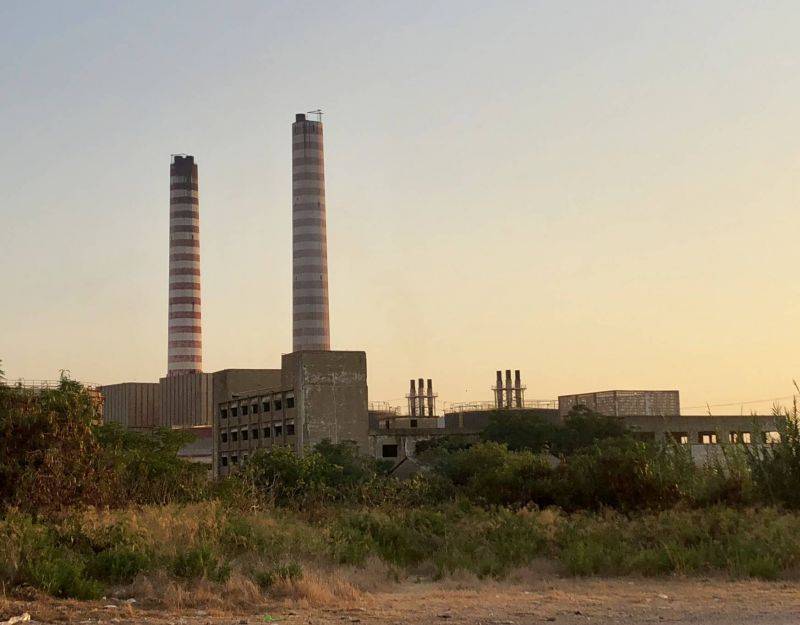
The Zouk Mosbeh power plant north of Beirut. (Credit: Philippe Hage Boutros)
The Lebanese caretaker cabinet issued a decision on Friday tasking the Lebanese Army with the "immediate removal" and transfer of the chemical materials present in the Zouk power plant to an uninhabited location, pending their proper disposal.
According to a decision by the cabinet that L'Orient Today obtained, the Energy Ministry and Electricité du Liban (EDL) are tasked with "expediting the packaging, transportation and evacuation process of the expired chemicals" present in the plant, through an over-the-counter contract with a private company and not through a call for proposal. The Energy Ministry and EDL should, according to the cabinet, "coordinate with the concerned ministries and units, especially the Environment Ministry, to provide it with the entire exportation file." The Environment Ministry had previously been tasked with it.
"In order to preserve public health and safety, the Army Command is tasked with immediately transferring the hazardous materials to a safe and uninhabited place pending their removal," the cabinet decision added.
On Saturday, there was no indication that the decision was immediately implemented, and the Lebanese Army told L'Orient Today that the ministries of energy and environment should be the ones commenting on the matter.
Environment Minister Nasser Yassine, who sent the decision to L'Orient Today, could not immediately comment on the matter.
The Energy Ministry and EDL also could not immediately be reached for a comment on the matter.
In a statement on Wednesday, the media office of caretaker Prime Minister Najib Mikati assured that the chemicals at the Zouk Power Plant are stable, well-stored and regularly inspected, but the decision made Friday by cabinet mentioned that chemicals' presence in Zouk is "worrying."
The sensitivity around these chemicals in Lebanon has increased since the catastrophic 2020 Beirut port explosion caused by improperly stored ammonium nitrate. Although the war in Gaza and southern Lebanon diverted attention from hazardous materials, new controversies have brought the issue back into focus.
Residents near the power plant are particularly worried about dangerous substances like hydrochloric acid, which is non-flammable on its own but can become a flammable gas upon contact with other compounds.
Mikati's office assured that these chemicals do not threaten the safety and public health of the plant’s surroundings, contrary to media reports.
On June 4, Kataeb MP Salim Sayegh raised concerns about potentially hazardous products stored at the Zouk power plant during a press conference in Parliament. He highlighted that a German company, CombiLift, represented by Tecmo, has been unable to move these materials due to a lack of authorization from the Environment Ministry. Sayegh warned that Tecmo had threatened to terminate its contract with EDL because of the delay.
Caretaker Environment Minister Nasser Yassine had denied responsibility for this delay.
Mikati's office stated that the responsibility for transporting expired chemicals like "trisodium phosphate" and "disodium trioxosilicate" lies with the waste producer or owner, namely the Energy Ministry and EDL.
EDL reported having approximately 350 kg of hydrochloric acid necessary for the plant's operation, securely stored in a warehouse approved and supervised by the Lebanese Army and inspected by security services.
For expired chemicals, EDL contracted Tecmo S.A.L. to package and transport these materials, but the transfer has been delayed due to the Environment Ministry's approval process.
The Environment Ministry had stated that EDL must dispose of chemicals in an environmentally sound manner per legal requirements. If EDL wishes to export these wastes for treatment abroad, they must submit an export file to the ministry with the required documents.
On April 23, the General Directorate of State Security issued a document about a patrol conducted on March 26 at the plant, confirming the presence of potentially dangerous explosive chemicals. The chemicals "trisodium phosphate" and "disodium trioxosilicate" were reported as not dangerous but expired and packed for transport. Hydrochloric acid, isolated in a designated, licensed warehouse, was identified as potentially dangerous.